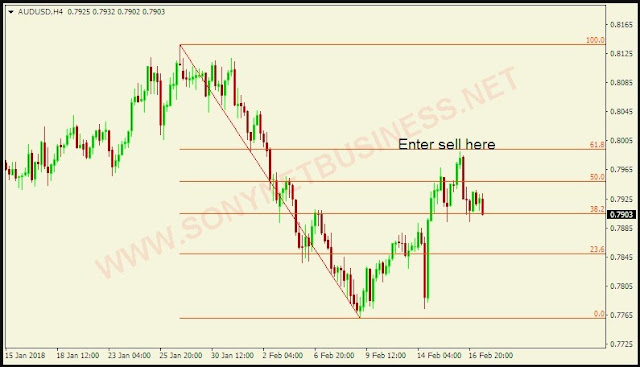 |
| Forex Trading Psychology |
The importance of trading psychology in the FX market cannot be overstated. It is concerned with a trader's emotional state when initiating and leaving transactions, searching for new trade opportunities, and performing other trading-related chores.
Most traders lose money as a result of negative emotions that contaminate their rational decision-making processes and lead to ill-advised trade decisions.
As humans, we are essentially emotional animals, which influences our decisions. When we make decisions or have tantrums because something isn't working well, we tend to inflate our egos.
Although these feelings aren't always incorrect, how we respond to them is crucial, especially when trading currencies.
If your emotions get the best of you and you can't control them, you'll make irrational decisions. Even if you are a seasoned trader, you will eventually lose money on trades that should have been successful.
Some traders believe that separating themselves from their emotions will fix their issues. However, if you are still a human being, this is impossible. If you use your feelings correctly, they can help you increase your trading success.
In forex trading, trading psychology can mean the difference between success and failure. To become a consistently profitable trader, you must first maintain a stable mental state.
So, how do you keep your emotions in check and make them work for you rather than against you?
Let's start with the four most common psychological barriers to successful trading.
1. Trading Psychology and Fear
2. Greed as a Psychological Factor in Trading
3. Trading Psychology Revenge
4. Trading Psychology's Euphoria
1. Trading Psychology and Fear
Fear is our natural reaction to threats that threaten to damage us. It's natural to be afraid. In fact, emotion is thought to be essential for our existence. It will be impossible to identify danger and flee it if you are not terrified.
Fear, on the other hand, is damaging in forex trading when it causes us to make irrational and unsound actions in response to imagined loss-making dangers.
Fear, rather than driving us to execute trades without fear, discourages us from doing so, convincing us that we are wrong. This dread of being wrong trumps our analysis and the amount of time we've spent hunting for favourable setups, leading us to the dark side of the market.
Another anxiety is missing out on profitable trades. This concern often leads us to enter trades at any price, rather than waiting for winning trade setups to arise. A scared trader who doesn't want to miss out on good possibilities frequently abandons a reasonable approach to trading and lets their emotions govern their actions.
The last form of fear is loss, which is considerably more harmful. Fear of failing creates a psychological panic in our minds and sends us ominous warnings before we make trading decisions.
What would you do if you had a long running position on the EUR/USD currency pair and received unfavourable news about the status of the Eurozone economy?
In such circumstances, most traders will be terrified, overreact, and close the trade without hesitation. Despite the fact that individuals may be acting to avoid losses, fear often motivates such actions, which may result in them missing out on potential benefits.
Fear in forex trading frequently ends in disaster: as traders make irrational judgments, their trading accounts gradually deplete—until margin calls are issued.
2. Greed as a Psychological Factor in Trading
Fear is dangerous, but greed is far more so. Greed is a greedy emotion that makes you desire to make more money every time you trade forex.
To put it bluntly, every forex trader wishes to profit handsomely from their efforts. When it becomes too strong, though, this craving becomes ineffective, if not dangerous.
There's nothing wrong with wanting to achieve financial success in forex trading. However, if your greedy impulses smother your common sense and dominate your trading judgments, you've got a problem.
"When bulls and bears make money, pigs get slain," as the adage goes among financial traders. The pig is a greedy animal, and the comparison is important in the trading world since it demonstrates that the market does not appreciate pigs—greedy pigs lose money.
As a result, greed is even more destructive than fear as a psychological feeling. Fear might make it difficult to make trade judgments or cause you to withdraw too soon. Greed, on the other hand, makes you hit the buy or sell button in a way that is far too dangerous. As a result, greed is far more harmful than plain fear.
Greed is a hazardous feeling because it causes us to act irrationally. When greed has inebriated your system, it might cause you to behave recklessly, just like when you drink alcohol. If greed impairs your trading decisions, you're high on it, and you'll soon lose your trading account.
Greedy traders, for example, frequently hesitate to quit winning positions because they believe the market will always obey them. Greedy traders will also add to open positions if the market moves in the direction they expect. Overleveraging, getting into trades too early, and overtrading are all harmful habits of greedy traders.
3. Trading Psychology Revenge
Another dangerous feeling that obstructs trading performance is vengeance. Revenge trading occurs when traders attempt to make more aggressive trades after losing a previous trade.
While the fundamental goal of vengeance trades is to recoup losses, they frequently result in greater losses than anticipated. Revenge traders frequently blame the market for their losses, leading to retaliatory and ill-advised trades.
There are three basic reasons why revenge trading is detrimental. For starters, because it's usually not properly planned, it leads to hasty trades that are less likely to be profitable. You will be gambling rather than trading if you engage in revenge trading. Without any forethought or thorough study, you will quickly place deals.
Second, vengeance trading drives you to open trades with greater position sizes since you are desperate to recoup your losses. Because you want to recoup your losses quickly, you will disregard the risk management section of your trade strategy.
Finally, it's an emotional trading behaviour motivated by the wrong motivations. It shifts your emphasis away from sensible trading judgments and toward emotional trading decisions. Your emotions cloud your judgement and cause you to toss discipline and solid judgement out the window, causing your account to bleed pip by pip.
You can enter a long order on EUR/USD, for example, but you will lose 50 pips. You decide to quadruple your position size on the next transaction, frustrated, in order to recoup your previous loss. However, the trade goes against your expectations once more, bringing more losses to your trading account. Because the market "owes" you money and you want to get "your" money back, it will be easy to open a larger position today.
4. Trading Psychology's Euphoria
Finally, euphoria can make it difficult to trade successfully. It's the sensation of elation that comes after a string of large gains in the currency market. Your euphoria convinces you that you have a perfect comprehension of currency pairs and that your assessments are flawless.
While it is natural to be elated following a successful deal, overconfidence can lead to complications. For example, just because you won on a long order on EUR/USD doesn't indicate you'll win on another trade. The market does not operate in this manner.
Trading blunders and losses are frequently the result of euphoria. Following a string of profitable deals, a trader may grow overconfident and begin placing trades without thoroughly analysing the constantly shifting market conditions.
Overconfidence can also lead to you risking too much money, believing erroneously in your analysis, or forgetting about your trading strategy. After each good transaction, throwing a celebration is an emotional motivator that might exacerbate your trading weaknesses.
How to Get Past Psychological Barriers
Invest in forex training
One of the most important factors in overcoming the aforementioned psychological barriers is forex trading education. You will develop vital abilities for making reasoned decisions rather than relying on your gut feelings with adequate training.
You'll become emotional and risk your trading capital if you wish to initiate and quit transactions without having solid reasons for doing so.
You must comprehend how the forex market works and the elements that cause it to fluctuate. If an economic news report is produced, for example, you should know how it is likely to effect market movements rather than becoming afraid and closing and opening transactions indiscriminately.
A good forex education will help you develop a technique that will provide regular earnings. There is far too much possibility for disaster when trading without a profitable approach. A dependable trading technique, on the other hand, will help you relax and be calmer by lowering your risk and worry.
Stick to your trading strategy
Trading using a well-thought-out strategy reduces risk and helps you manage your emotions. A trading plan is often made up of a collection of instructions and tactics for making trade decisions.
After conducting considerable research and examining market activity, a trading plan is usually developed. It's what you'll need to keep your trading consistent and profitable.
A solid trading plan, for example, should be able to answer the following questions.
- How many pips each trade should I aim for?
- When do I make my trades?
- How much of my capital am I willing to put at risk with each trade?
- What rules should I follow when it comes to trading?
- What is the best way for me to handle open trades?
- What regulations should I follow when it comes to leaving trades?
If you allow uncertainty and fear to run rampant, emotions can wreak havoc on your control. A well-designed trading plan, on the other hand, will help you stay focused and profitably trade without getting distracted by your gut reactions.
Trading without a strategy leaves you vulnerable to your emotions. As a result, you'll be trading based on your emotions rather than a thorough understanding of market activity.
You won't have to change your trade judgments fearfully or greedily when there's an indication of problems if you have a plan. All of your decisions about when to join and quit the market will be guided by your predetermined set of rules, leaving no opportunity for emotion to distort your judgement.
If your trading strategy states that you will enter retracement trades once the market bounces off one of the Fibonacci levels, for example, you should follow it as closely as possible.
Here's a 4-hour chart of the AUD/USD to show how the rule could be used.
 |
| Stick to your trading strategy |
Use risk management techniques
A trader's risk management distinguishes him from a gambler. You could lose a lot of money if you put too much money into the market out of vengeance or joy.
To prevent becoming an emotional trader, never risk more money than you can afford to lose. For each trade, a popular rule of thumb is to risk only 1% of your capital.
You should avoid fearfully moving or ignoring stop losses and take profit targets in addition to using leverage wisely. Managing transactions emotionally raises the dangers.
Here's an example of a EUR/USD short transaction.
 |
| Use risk management techniques |
If you entered the trade and watched it move towards the target level, increasing the take profit level too far could raise the risk of a reversal, converting a winning trade into a loss. Your trade plan should initially reduce risk by adjusting your stop loss level before adjusting your take profit level.
Make a mental shift
Emotional trading is often caused by a naive perspective. You might easily fall into the dangerous habit of being scared, greedy, revengeful, or euphoric if you are not focused and composed when making trading decisions.
You must adopt a realistic perspective and develop emotional maturity as a trader. Keep in mind that simply wanting to generate money will not be enough to get you there. You should use self-discipline in the market and avoid making decisions based on ecstasy or other emotions.
Your emotions will be unable to dominate your trading judgments if you have a clear and logical thinking.
Ending
Forex trading psychology is an important component of becoming a good trader. This is what causes the majority of trading errors for the majority of traders.
As a result, you must work hard to keep your emotions under order. If you don't learn to control them, they'll eventually control you, and you'll come to regret the trading judgments you made based on your emotions.
Your forex trading career's success or failure is determined by your ability to remove emotions from trading decisions, and that ability is the alpha and omega of lucrative currency trading.














.png)
.png)